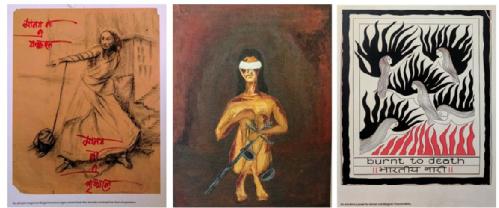Warwick Law School News
Warwick Law School News
The latest updates from our department
Rewriting Judgements in the Indian Feminist Judgement Project
Earlier this month, Assistant Professor at Warwick Law School, Dr Laura Lammasniemi participated in the first workshops for the Indian Feminist Judgment Project (FJP) held in O. P. Jindal Global University, Sonipat in India. We caught up with Laura to find out more.
Laura, can you tell us about the Indian Feminist Judgment Project (FJP)?
The idea behind the Indian FJP is to take landmark judgments from the Indian jurisdiction and rewrite the judgment from a feminist perspective, to show that a different - better and more equal- outcome or reasoning would have been possible.
The Indian FJP is the latest in a series of similar projects in other jurisdictions, including Australia, England, Wales, and Ireland – many of which have contributors from Warwick Law School.
What is your involvement in the project?
I am rewriting a judgment in a case of Bhikaji v Rukhmabai (1887) together with Kanika Sharma from SOAS, University of London.
The case of Rukhmabai is an interesting case from colonial India. On the face of it, the case is about the restitution of conjugal rights i.e. if a person can be forced to return to live with their spouse.
Beyond the basic legal issues, the case allows us to reimagine what consent to marriage and consent within a marriage can mean. Had this case been decided differently, it would have changed the course of women’s rights in India for decades after.
Beyond the legal perspective, the story of Rukhmabai is an inspiring, multi-faceted tale of a young woman who challenged her child marriage in court, and chose to accept a prison sentence rather than live with the man to whom she had been married to at the age of eleven.
By doing so, Rukhmabai became an unlikely icon for the women’s rights movement in India and Britain, and she later became the first practicing female medical doctor in India.
How does this work relate to your research?
The project, and the case of Rukhmabai, forms part of a larger project I am working on regulating age of consent in the British Empire with Kanika Sharma.
We are particularly interested in how sexual consent was understood within law, religion and society and on the distinctions made between physical and intellectual maturity in relation to capacity to consent.
We are also intrigued by how consent, in all its complexity, was imagined for different sexes, races, and nationalities within the Empire.
We are organising a conference on 15 June 2018 at SOAS on Comparative perspectives on regulating age of consent and child-marriage in the British Empire, 1880 to 1930; and have an exciting line up of speakers joining us from India, US, Canada, and South Africa.
 How did the first Indian FJP workshops go?
How did the first Indian FJP workshops go?
The workshops, spread over three days, were very engaging. In addition to traditional workshops and presentations, we had sessions with practitioners, judges and filmmakers.
We also got a chance to see exhibitions curated by Jindal law students on the theme of feminist judging. This is a long-term project, both from an Indian and global context and we are already in talks for organising a related workshop at Warwick.
